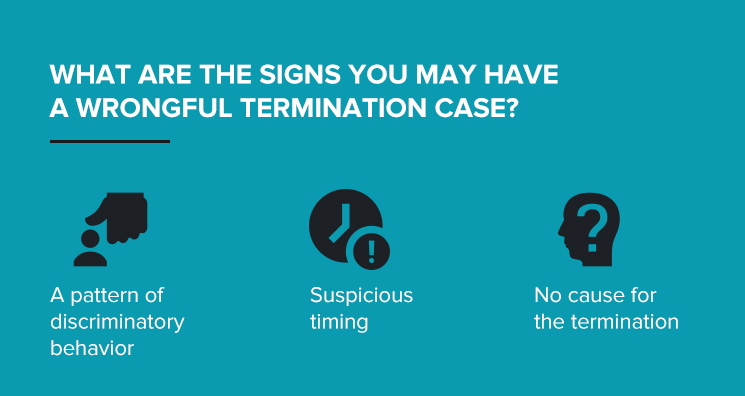Being terminated from a job you love can be financially and emotionally devastating, particularly if you were fired unjustly. If your termination was an act of discrimination, you can sue for wrongful termination. Pennsylvania workers are protected under federal and state law against discrimination in the workplace and wrongful termination.
Follow this guide to wrongful termination and PA employment termination laws if you believe you have a wrongful termination case. With an experienced employment lawyer from Weisberg Cummings, P.C. on your side, you can fight to win your case and receive the settlement you deserve.
What Is Wrongful Termination?
If an employee is fired for an illegal or unethical reason, this is known as wrongful termination. Many wrongful termination cases are preceded by harassment or discrimination in the workplace. Under federal law, an employee cannot be fired for a discriminatory reason, and many state laws provide protections to employees who have been wrongfully terminated.
What Counts as Wrongful Termination?
Pennsylvania is one of many at-will states, meaning that unless you are in a union or have a specific contract of employment, you can be fired or demoted at any time without cause or for any legal reason. However, there are some exceptions to this rule, including illegal and unethical reasons. Possible instances of discrimination include:
- Sexual orientation discrimination
- Veteran status discrimination
- National origin discrimination
- Race or color discrimination
- Religious discrimination
- Disability discrimination
- Gender discrimination
- Age discrimination
- Retaliation
If you are fired because you are pregnant, have a disability, are on maternity leave or complained about illegal discrimination, you may have a wrongful termination case. In addition to discriminatory reasons, you cannot be fired for:
- Standing up for your rights: If you speak up for yourself or co-workers in certain ways, such as by reporting safety violations or sexual harassment, you cannot be fired for this reason. This is also true if you are assisting in a discrimination investigation by testifying in court or speaking to investigators.
- Taking leave you are entitled to: If you are entitled to leave under the Family and Medical Leave Act (FMLA), military leave or jury duty leave, you cannot be fired for taking it. For example, an employer cannot retaliate against you for taking your unpaid jury duty leave. However, not every employee is entitled to these types of leave, so be sure you are eligible.
- Refusing to commit a crime or abet a crime: Pennsylvania courts want to protect the public interest, which includes protecting employees who refuse to commit a crime or abet a crime for an employer. If your employer pressured you to commit perjury or avoid reporting regulatory violations, you cannot be fired for refusing to do so.
- Making a request you are entitled to make: Your employer also cannot fire you if you make a request for reasonable accommodations. Under the Americans with Disabilities Act (ADA), if you are a worker with a disability, you are entitled to reasonable accommodations in the workplace that allow you to do your job effectively. Similarly, you cannot be fired because you filed a workers’ compensation claim.
What Is the Difference Between Wrongful Termination and Unfair Termination?
While you can sue your former employer for wrongful termination in Pennsylvania, you cannot sue for unfair termination. This is why it is essential to know the difference. Wrongful termination occurs when you are fired for an illegal or unethical reason, whereas unfair termination occurs as a result of nepotism, favoritism or simple dislike. Though you may be angry and frustrated if you are fired on the basis of unfair treatment, you cannot sue for unfair termination.
What Are the Signs You May Have a Wrongful Termination Case?
If you have recently been fired, it can be hard to determine whether you were wrongfully terminated. Though employers can fire you without cause, they may give you a reason to make the termination appear legitimate. If you have noticed any of the following signs, you may want to reach out to an attorney:
- A pattern of discriminatory behavior: If you were subjected to discriminatory remarks and a demotion before your termination, this can show a pattern of discriminatory behavior, which may have led to your wrongful termination.
- Suspicious timing: If the timing for your termination is suspicious, you may have a wrongful termination case. For example, if you were on the verge of retiring with full benefits or you were fired soon after exposing the company’s illegal activities, your situation deserves further investigation.
- No cause for the termination: If you consistently received positive performance reviews and were with your employer for a while, yet you were fired without any reason given, this could be a red flag. If similar employees remain employed or are being given promotions and raises, this may be a sign of wrongful termination.
Wrongful Termination Laws in PA
Pennsylvania and federal laws regarding employment and termination are complex, which is why it is important to have an experienced attorney on your side to advise you on whether you have a case and how you can proceed.
Equal Employment Opportunity (EEO) Laws
Under the EEO laws, certain types of job discrimination are prohibited in the workplace. Two agencies under the U.S. Department of Labor (DOL) handle EEO monitoring and enforcement. These are the Office of Federal Contract Compliance Programs, which oversees the employers who hold federal contracts and subcontracts, and the Civil Rights Center (CRC), which oversees EEO in activities and programs that receive federal financial assistance.
PA Statute of Limitations for Wrongful Termination
In the Keystone State, the time limits to file wrongful termination claims can be very short. If you believe you were filed for illegal discrimination, you only have 180 days to preserve your claims with the Pennsylvania Human Relations Commission. In other situations you may have anywhere from 30 day to two years to file a wrongful termination claim. If you miss these deadlines, your claim may be dismissed. According to the Fair Labor Standards Act (FLSA), if you need to make a wrongful termination claim, you also have two years to make your claim. To ensure you do not miss any deadlines, reach out to a lawyer and file your claim as soon as possible.
Weisberg Cummings Can Help You Fight Against Wrongful Termination
At Weisberg Cummings, P.C., we have decades of experience in employment matters. We understand the wrongful termination laws in Pennsylvania, and we can ensure you can fight for your case and recover the settlement you deserve. Discrimination laws differ from state to state, so having a professional who understands the laws in Pennsylvania is crucial.
With a qualified attorney on your side, the process can move quickly, especially if this is the first complaint made against your former employer. A lawyer will know which evidence to gather and research and how to strengthen your case.
Schedule a Free Consultation
If you are concerned about your termination and believe you may have been discriminated against, you deserve legal counsel to fight your case. You have protections and rights under the law, and you should not be fired based on your age, gender, race, national origin, pregnancy or religion.
At Weisberg Cummings, P.C., our employment lawyers can help determine whether you have a wrongful termination case. An experienced lawyer can help you pursue your case while you seek other employment. If you believe you may have a wrongful termination case, contact us today to schedule a free consultation with our experienced employment lawyers.



